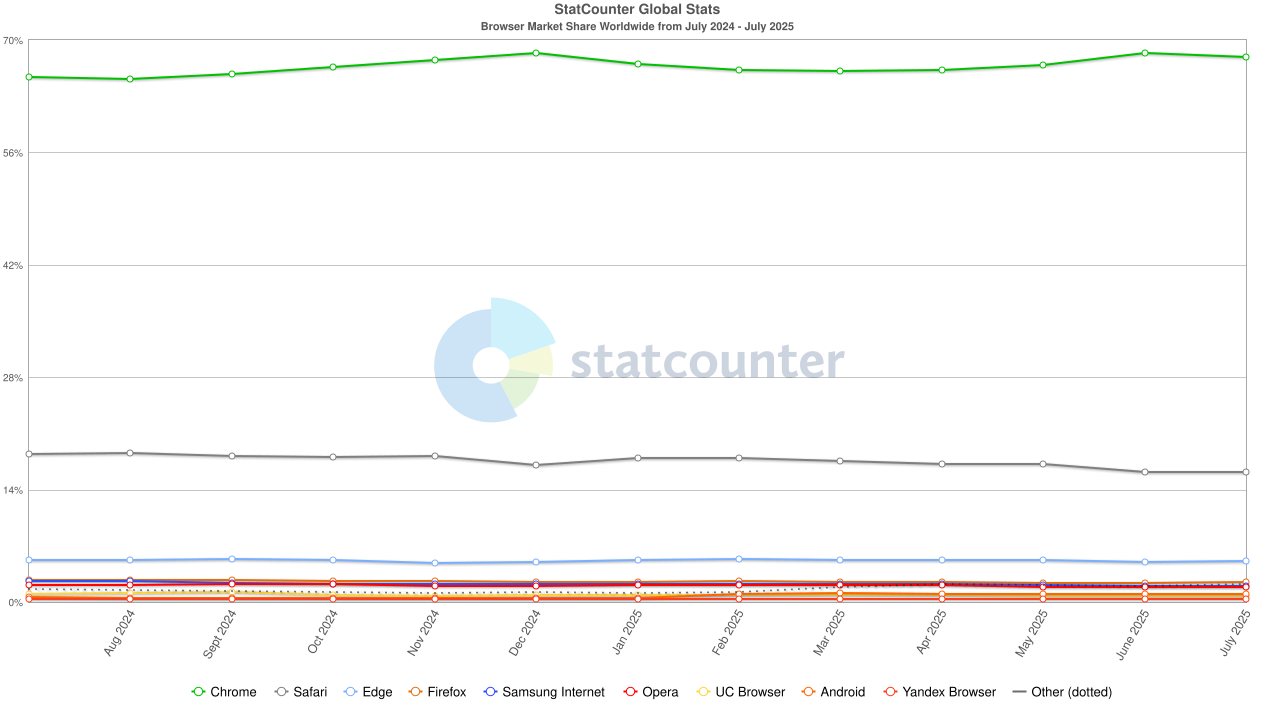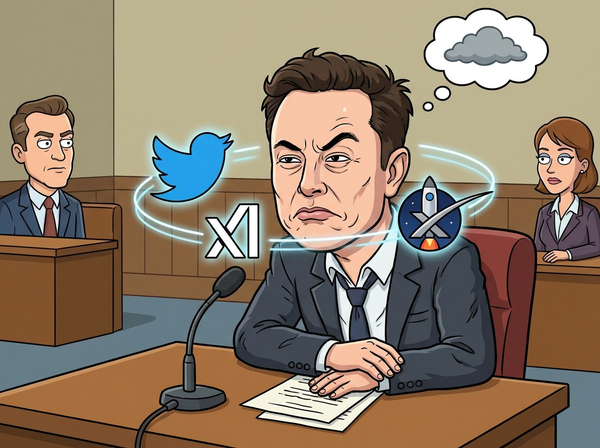Cyber and You: Let's talk browsers...
The next step in online hygiene is to consider which browser you use. The net-net is to ditch Chrome.

Last week, I tried to lay out why you should at least partially walk away from Gmail. I know how hard that could be, as I was one of the first wave of adopters in the early aughts. Still, keeping your data within the grubby mitts of Google's data mining monstrosity is not a good idea.
Today, let's talk about internet browsers. If you are using Gmail, odds are that you are accessing it via the Chrome browser. Of course, since the useragent tag is available, there are hard statistics:

It is shocking, about 66% of all users use Chrome to browse, followed by Apple's Safari at about 18%, and then it falls like a stone.
Clearly, (most) people get their new PC, jump onto the internet, and their first thing is to go back to their comfort zone, and download Chrome (and then go to their Gmail page). Alas, that is not a great thing.
I will explain why you may want to rethink this behavior.
First - why it is dominant
The fact that Google's Chrome has been at about 90% of the browsers seen in the wild is not for nothing. It (and the Chromium rendering engine) is the de facto standard of the world wide web. Web developers use it, it has built in goodies to help you diagnose weird rendering issues, and since it is what the developers who create the HTML and CSS that make the web look like it does, to coin a phrase from Apple "It just works".
Google released it on September 2, 2008, a time so long ago that it feels shrouded in mystery. But that was back when Google almost kept to their original motto: "Do no evil". Ah, good times. Before that, the dominant browser was Microsoft's Internet Explorer, a homeless abortion crawling up the legs of distraught users, and a somewhat distant second was the Firefox browser that was the descendant of the original Netscape (the company that made Marc Andreesen an insufferable billionaire asshole).
I was a firefox user, but my recollection at the time was that it was a mediocre experience, with plugins that sorta worked, but also sorta sucked ass. Like early Wordpress, the people who wrote and published many of these plugins wrote buggy, insecure code that led to people being hacked. It was a minefield.
When Chrome dropped, it was fast, it was by Google, the "Don't do evil" people, and it was fresh.
It quickly became my go to, and the go to for all the people I knew. It was that good.
And, as they say, what you get comfortable with is what you will stick with. That is why I listen to a lot of 80's vintage hard rock.
The evil turn
It is tempting to read the prior section, and assume that Google had good intentions with the development and release of Chrome. They were giving the world a killer web browsing experience for free.
Altruism, amirite?
Well, not so fast. Google initially went public in 2004, and that is when the "Do no evil" mantra was codified. They had the search engine that everyone used, but they also knew they needed to make cold hard cash to placate their newly hungry investors. And the obvious answer was to build an advertising business. They already had everyone's attention when they searched, so it was a natural evolution to pivot to advertising.
And then began a series of acquisitions to build out the world's most dominant advertising tech stack.
A key component to this was an independent ad market where advertisers bid for placement on websites called Double Click. [1]
That acquisition closed in early 2008, a few months before Chrome was launched. I'm sure that was a mere coincidence. And if you believe that, I have some dry land in Florida to sell you.
No, Double Click was the start of the ethical slide, but adding the surveillance that Google can do with your usage of Chrome (and most people log into their gmail account and that will handily sync settings between different computers and now devices. Handy, but evil as fuck).
Add to that the webmaster tools, and Google analytics, and every (and I truly mean EVERY) website has Google tracking codes embedded in it.
Every time you browse, you are revealing information about you, your habits, and how to target ads to you with eerily accurate precision.
Ok, I'm concerned, what should I do?
Fortunately, unlike in 2008 you have options that don't suck ass.
If you are an Apple person, you can use the bundled Safari browser. But, it has some real issues at times rendering pages. And it is inconsistent. It uses the WebKit renderer [2], that isn't great, but it integrates well with Apple's ecosystem. And it is #2 in the market, so web pages do test against it and fix the worst of the glitches. Still, I am not that big of a fan, but it works, and if you don't know any better, it is fine.
Firefox is still out there, and about a decade or so ago they got their ecosystem of plugins under control, so it mostly works. A lot of people, including my wife, use it, and are happy with it. To wit it works, and is functional. It does have some quirks that if you drop into it once a month or so like I do, it will trip you up, but it is fine. The Mozilla foundation owns and maintains it, so if you use it, you ought to kick them a few bucks.
Microsoft uses the open source Chromium rendering engine in their bundled browser Edge. That give you the best in class rendering that you would get with Google's Chrome, but Microsoft strips out the egregious surveillance garbage that Google uses to track your every move. It isn't perfect, but Microsoft doesn't make 90% of their revenue from advertising, so I feel better about using it.
Then we get to the smaller players, of which Opera is probably the best of the bunch. I keep installs of Opera around, but it just never became my go to. That said, they do not do any tracking, so if you value your privacy enough to have some inconveniences when you surf, it is great.
A late entry is the Brave browser. I haven't used it, but it by default blocks advertisements, so no need to have a plugin for blocking ads.
Final thoughts.
If you are using Chrome because you always have, it is time to think about other browsers if only to deprive Google from some of the fuel that feeds their advertising juggernaut.
Google has lost their antitrust case on advertising and search, and while I am not holding my breath that they will be properly punished. You can take concrete efforts to make their life a little bit more difficult.
I highly recommend you checking out the listed alternatives above and find one that works.
I am dismayed that my employer recommends Chrome for internal web apps, but that is neither here nor there (I use Edge)
The next installment is password managers
1 - https://smallusefultips.com/why-did-google-buy-doubleclick/
2 - this is something that Apple also forces even other browsers on iOS devices to use. It is thoroughly a mid browser experience




